Mental Capacity Act 2005: Impact on Dementia Care and Liberty
VerifiedAdded on 2020/09/08
|10
|3839
|40
Essay
AI Summary
This essay provides a comprehensive overview of the Mental Capacity Act 2005 and its multifaceted implications. It begins by outlining the core principles of the Act, which provides a legal framework for adults lacking the capacity to make decisions for themselves, particularly focusing on the impact within the workplace. The essay delves into the Act's relevance to dementia care, exploring how it supports decision-making for individuals with neurological disorders, and the role of social workers and dementia organizations in implementing the act. Furthermore, the essay analyzes the concept of deprivation of liberty within the context of the Act, examining the Bourne-wood gap and the legal safeguards in place to protect individuals' rights. The essay highlights the impact of the act on service provider organizations and the importance of training and development for employees working with individuals affected by dementia. Overall, the essay emphasizes the importance of the Act in safeguarding the rights of vulnerable people and ensuring they receive appropriate care and support.
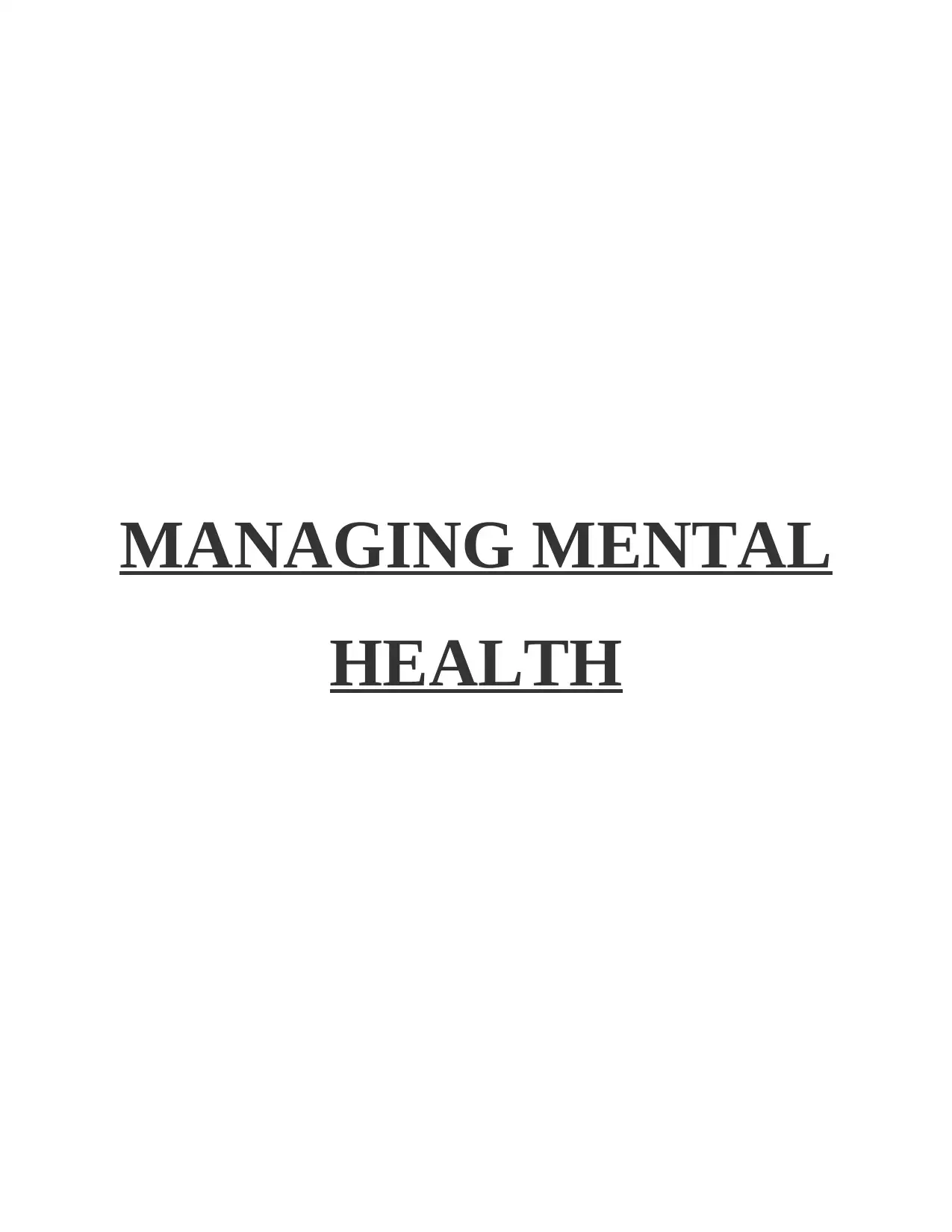
MANAGING MENTAL
HEALTH
HEALTH
Paraphrase This Document
Need a fresh take? Get an instant paraphrase of this document with our AI Paraphraser
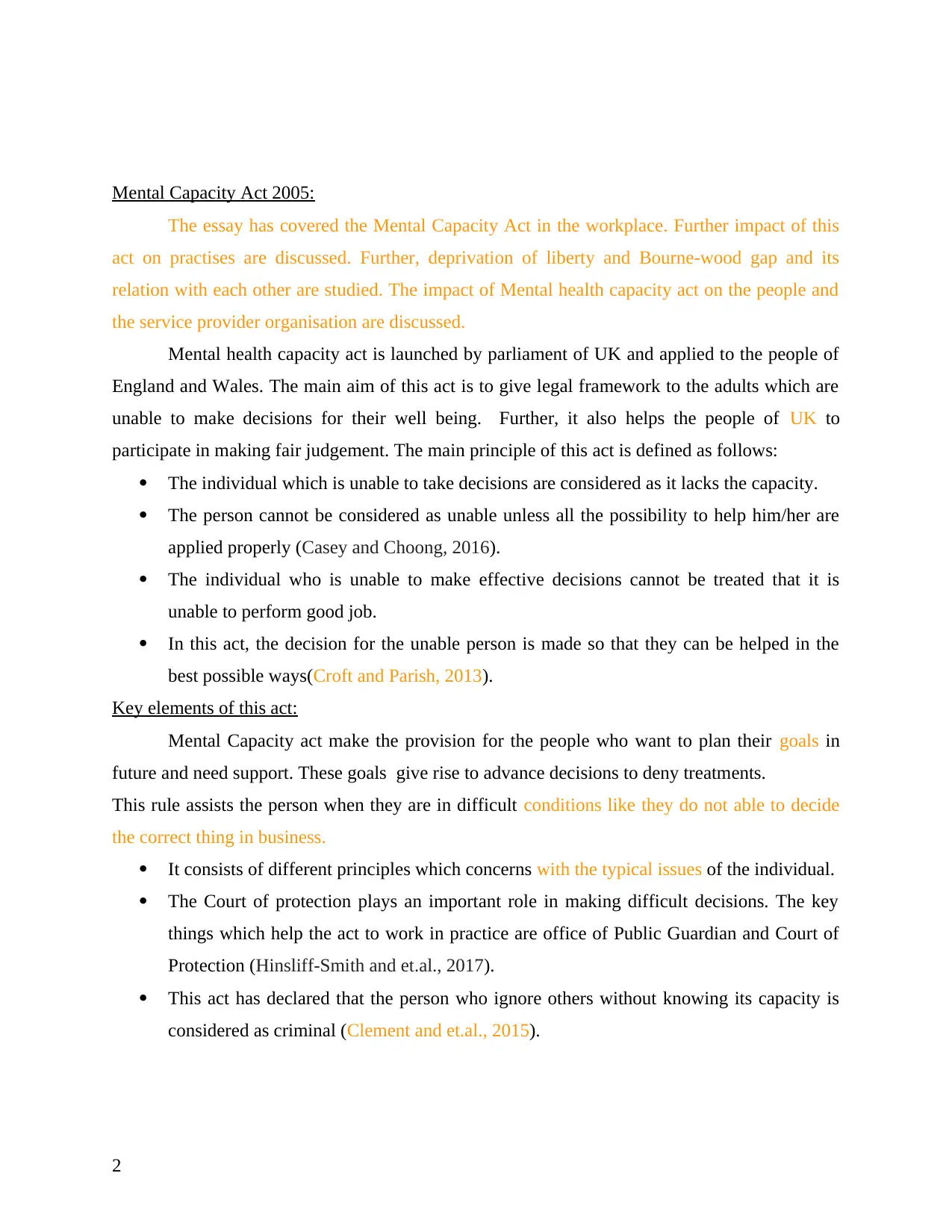
Mental Capacity Act 2005:
The essay has covered the Mental Capacity Act in the workplace. Further impact of this
act on practises are discussed. Further, deprivation of liberty and Bourne-wood gap and its
relation with each other are studied. The impact of Mental health capacity act on the people and
the service provider organisation are discussed.
Mental health capacity act is launched by parliament of UK and applied to the people of
England and Wales. The main aim of this act is to give legal framework to the adults which are
unable to make decisions for their well being. Further, it also helps the people of UK to
participate in making fair judgement. The main principle of this act is defined as follows:
The individual which is unable to take decisions are considered as it lacks the capacity.
The person cannot be considered as unable unless all the possibility to help him/her are
applied properly (Casey and Choong, 2016).
The individual who is unable to make effective decisions cannot be treated that it is
unable to perform good job.
In this act, the decision for the unable person is made so that they can be helped in the
best possible ways(Croft and Parish, 2013).
Key elements of this act:
Mental Capacity act make the provision for the people who want to plan their goals in
future and need support. These goals give rise to advance decisions to deny treatments.
This rule assists the person when they are in difficult conditions like they do not able to decide
the correct thing in business.
It consists of different principles which concerns with the typical issues of the individual.
The Court of protection plays an important role in making difficult decisions. The key
things which help the act to work in practice are office of Public Guardian and Court of
Protection (Hinsliff‐Smith and et.al., 2017).
This act has declared that the person who ignore others without knowing its capacity is
considered as criminal (Clement and et.al., 2015).
2
The essay has covered the Mental Capacity Act in the workplace. Further impact of this
act on practises are discussed. Further, deprivation of liberty and Bourne-wood gap and its
relation with each other are studied. The impact of Mental health capacity act on the people and
the service provider organisation are discussed.
Mental health capacity act is launched by parliament of UK and applied to the people of
England and Wales. The main aim of this act is to give legal framework to the adults which are
unable to make decisions for their well being. Further, it also helps the people of UK to
participate in making fair judgement. The main principle of this act is defined as follows:
The individual which is unable to take decisions are considered as it lacks the capacity.
The person cannot be considered as unable unless all the possibility to help him/her are
applied properly (Casey and Choong, 2016).
The individual who is unable to make effective decisions cannot be treated that it is
unable to perform good job.
In this act, the decision for the unable person is made so that they can be helped in the
best possible ways(Croft and Parish, 2013).
Key elements of this act:
Mental Capacity act make the provision for the people who want to plan their goals in
future and need support. These goals give rise to advance decisions to deny treatments.
This rule assists the person when they are in difficult conditions like they do not able to decide
the correct thing in business.
It consists of different principles which concerns with the typical issues of the individual.
The Court of protection plays an important role in making difficult decisions. The key
things which help the act to work in practice are office of Public Guardian and Court of
Protection (Hinsliff‐Smith and et.al., 2017).
This act has declared that the person who ignore others without knowing its capacity is
considered as criminal (Clement and et.al., 2015).
2
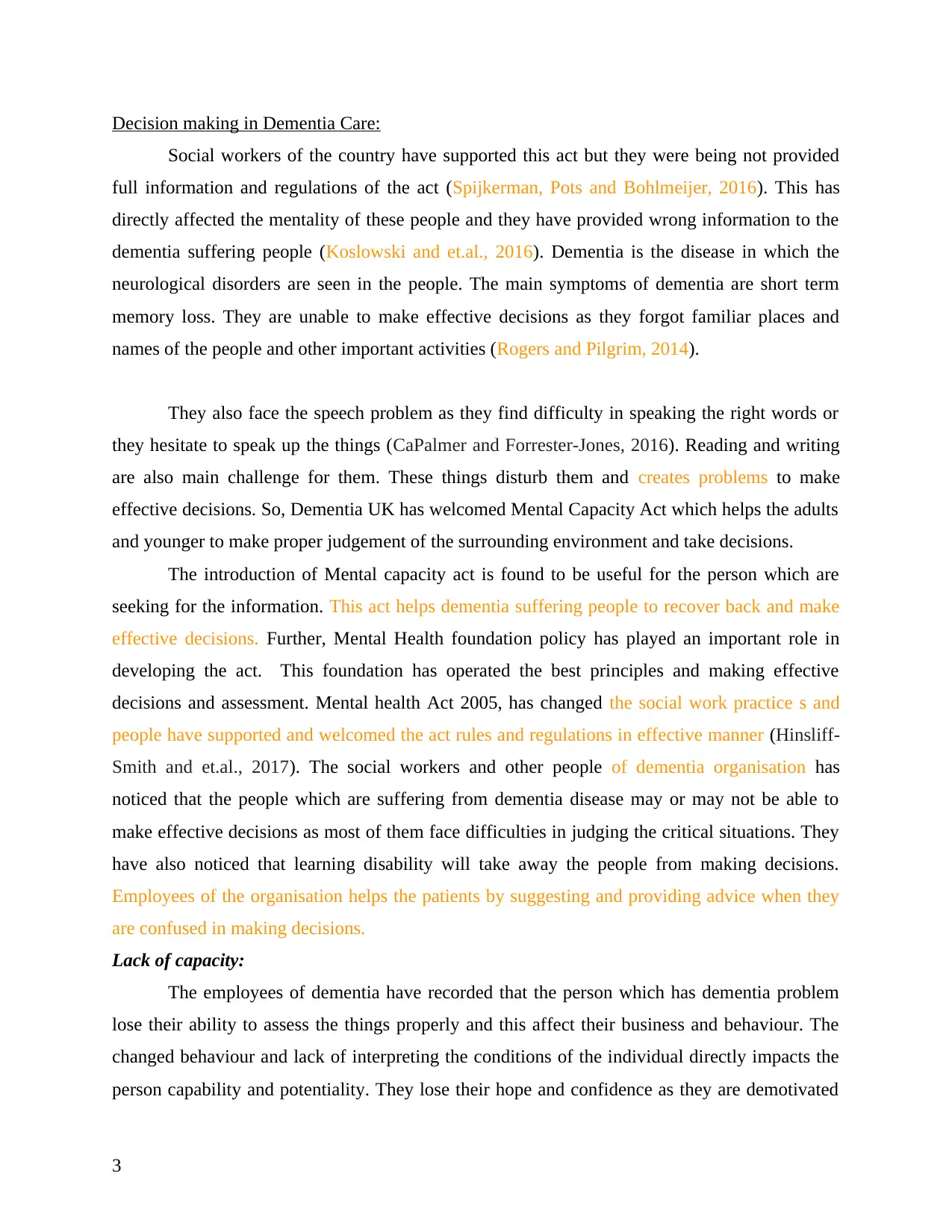
Decision making in Dementia Care:
Social workers of the country have supported this act but they were being not provided
full information and regulations of the act (Spijkerman, Pots and Bohlmeijer, 2016). This has
directly affected the mentality of these people and they have provided wrong information to the
dementia suffering people (Koslowski and et.al., 2016). Dementia is the disease in which the
neurological disorders are seen in the people. The main symptoms of dementia are short term
memory loss. They are unable to make effective decisions as they forgot familiar places and
names of the people and other important activities (Rogers and Pilgrim, 2014).
They also face the speech problem as they find difficulty in speaking the right words or
they hesitate to speak up the things (CaPalmer and Forrester-Jones, 2016). Reading and writing
are also main challenge for them. These things disturb them and creates problems to make
effective decisions. So, Dementia UK has welcomed Mental Capacity Act which helps the adults
and younger to make proper judgement of the surrounding environment and take decisions.
The introduction of Mental capacity act is found to be useful for the person which are
seeking for the information. This act helps dementia suffering people to recover back and make
effective decisions. Further, Mental Health foundation policy has played an important role in
developing the act. This foundation has operated the best principles and making effective
decisions and assessment. Mental health Act 2005, has changed the social work practice s and
people have supported and welcomed the act rules and regulations in effective manner (Hinsliff‐
Smith and et.al., 2017). The social workers and other people of dementia organisation has
noticed that the people which are suffering from dementia disease may or may not be able to
make effective decisions as most of them face difficulties in judging the critical situations. They
have also noticed that learning disability will take away the people from making decisions.
Employees of the organisation helps the patients by suggesting and providing advice when they
are confused in making decisions.
Lack of capacity:
The employees of dementia have recorded that the person which has dementia problem
lose their ability to assess the things properly and this affect their business and behaviour. The
changed behaviour and lack of interpreting the conditions of the individual directly impacts the
person capability and potentiality. They lose their hope and confidence as they are demotivated
3
Social workers of the country have supported this act but they were being not provided
full information and regulations of the act (Spijkerman, Pots and Bohlmeijer, 2016). This has
directly affected the mentality of these people and they have provided wrong information to the
dementia suffering people (Koslowski and et.al., 2016). Dementia is the disease in which the
neurological disorders are seen in the people. The main symptoms of dementia are short term
memory loss. They are unable to make effective decisions as they forgot familiar places and
names of the people and other important activities (Rogers and Pilgrim, 2014).
They also face the speech problem as they find difficulty in speaking the right words or
they hesitate to speak up the things (CaPalmer and Forrester-Jones, 2016). Reading and writing
are also main challenge for them. These things disturb them and creates problems to make
effective decisions. So, Dementia UK has welcomed Mental Capacity Act which helps the adults
and younger to make proper judgement of the surrounding environment and take decisions.
The introduction of Mental capacity act is found to be useful for the person which are
seeking for the information. This act helps dementia suffering people to recover back and make
effective decisions. Further, Mental Health foundation policy has played an important role in
developing the act. This foundation has operated the best principles and making effective
decisions and assessment. Mental health Act 2005, has changed the social work practice s and
people have supported and welcomed the act rules and regulations in effective manner (Hinsliff‐
Smith and et.al., 2017). The social workers and other people of dementia organisation has
noticed that the people which are suffering from dementia disease may or may not be able to
make effective decisions as most of them face difficulties in judging the critical situations. They
have also noticed that learning disability will take away the people from making decisions.
Employees of the organisation helps the patients by suggesting and providing advice when they
are confused in making decisions.
Lack of capacity:
The employees of dementia have recorded that the person which has dementia problem
lose their ability to assess the things properly and this affect their business and behaviour. The
changed behaviour and lack of interpreting the conditions of the individual directly impacts the
person capability and potentiality. They lose their hope and confidence as they are demotivated
3
⊘ This is a preview!⊘
Do you want full access?
Subscribe today to unlock all pages.

Trusted by 1+ million students worldwide
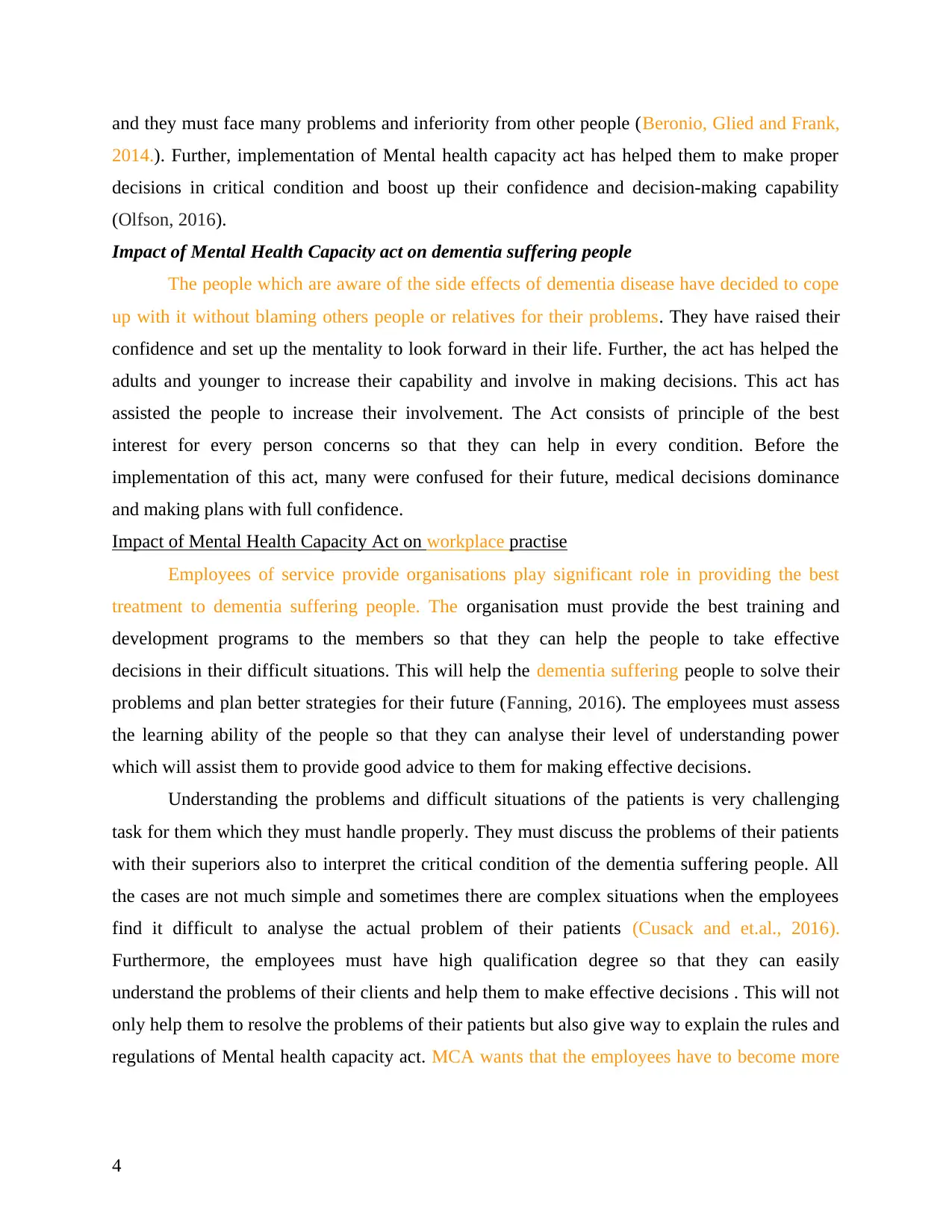
and they must face many problems and inferiority from other people (Beronio, Glied and Frank,
2014.). Further, implementation of Mental health capacity act has helped them to make proper
decisions in critical condition and boost up their confidence and decision-making capability
(Olfson, 2016).
Impact of Mental Health Capacity act on dementia suffering people
The people which are aware of the side effects of dementia disease have decided to cope
up with it without blaming others people or relatives for their problems. They have raised their
confidence and set up the mentality to look forward in their life. Further, the act has helped the
adults and younger to increase their capability and involve in making decisions. This act has
assisted the people to increase their involvement. The Act consists of principle of the best
interest for every person concerns so that they can help in every condition. Before the
implementation of this act, many were confused for their future, medical decisions dominance
and making plans with full confidence.
Impact of Mental Health Capacity Act on workplace practise
Employees of service provide organisations play significant role in providing the best
treatment to dementia suffering people. The organisation must provide the best training and
development programs to the members so that they can help the people to take effective
decisions in their difficult situations. This will help the dementia suffering people to solve their
problems and plan better strategies for their future (Fanning, 2016). The employees must assess
the learning ability of the people so that they can analyse their level of understanding power
which will assist them to provide good advice to them for making effective decisions.
Understanding the problems and difficult situations of the patients is very challenging
task for them which they must handle properly. They must discuss the problems of their patients
with their superiors also to interpret the critical condition of the dementia suffering people. All
the cases are not much simple and sometimes there are complex situations when the employees
find it difficult to analyse the actual problem of their patients (Cusack and et.al., 2016).
Furthermore, the employees must have high qualification degree so that they can easily
understand the problems of their clients and help them to make effective decisions . This will not
only help them to resolve the problems of their patients but also give way to explain the rules and
regulations of Mental health capacity act. MCA wants that the employees have to become more
4
2014.). Further, implementation of Mental health capacity act has helped them to make proper
decisions in critical condition and boost up their confidence and decision-making capability
(Olfson, 2016).
Impact of Mental Health Capacity act on dementia suffering people
The people which are aware of the side effects of dementia disease have decided to cope
up with it without blaming others people or relatives for their problems. They have raised their
confidence and set up the mentality to look forward in their life. Further, the act has helped the
adults and younger to increase their capability and involve in making decisions. This act has
assisted the people to increase their involvement. The Act consists of principle of the best
interest for every person concerns so that they can help in every condition. Before the
implementation of this act, many were confused for their future, medical decisions dominance
and making plans with full confidence.
Impact of Mental Health Capacity Act on workplace practise
Employees of service provide organisations play significant role in providing the best
treatment to dementia suffering people. The organisation must provide the best training and
development programs to the members so that they can help the people to take effective
decisions in their difficult situations. This will help the dementia suffering people to solve their
problems and plan better strategies for their future (Fanning, 2016). The employees must assess
the learning ability of the people so that they can analyse their level of understanding power
which will assist them to provide good advice to them for making effective decisions.
Understanding the problems and difficult situations of the patients is very challenging
task for them which they must handle properly. They must discuss the problems of their patients
with their superiors also to interpret the critical condition of the dementia suffering people. All
the cases are not much simple and sometimes there are complex situations when the employees
find it difficult to analyse the actual problem of their patients (Cusack and et.al., 2016).
Furthermore, the employees must have high qualification degree so that they can easily
understand the problems of their clients and help them to make effective decisions . This will not
only help them to resolve the problems of their patients but also give way to explain the rules and
regulations of Mental health capacity act. MCA wants that the employees have to become more
4
Paraphrase This Document
Need a fresh take? Get an instant paraphrase of this document with our AI Paraphraser
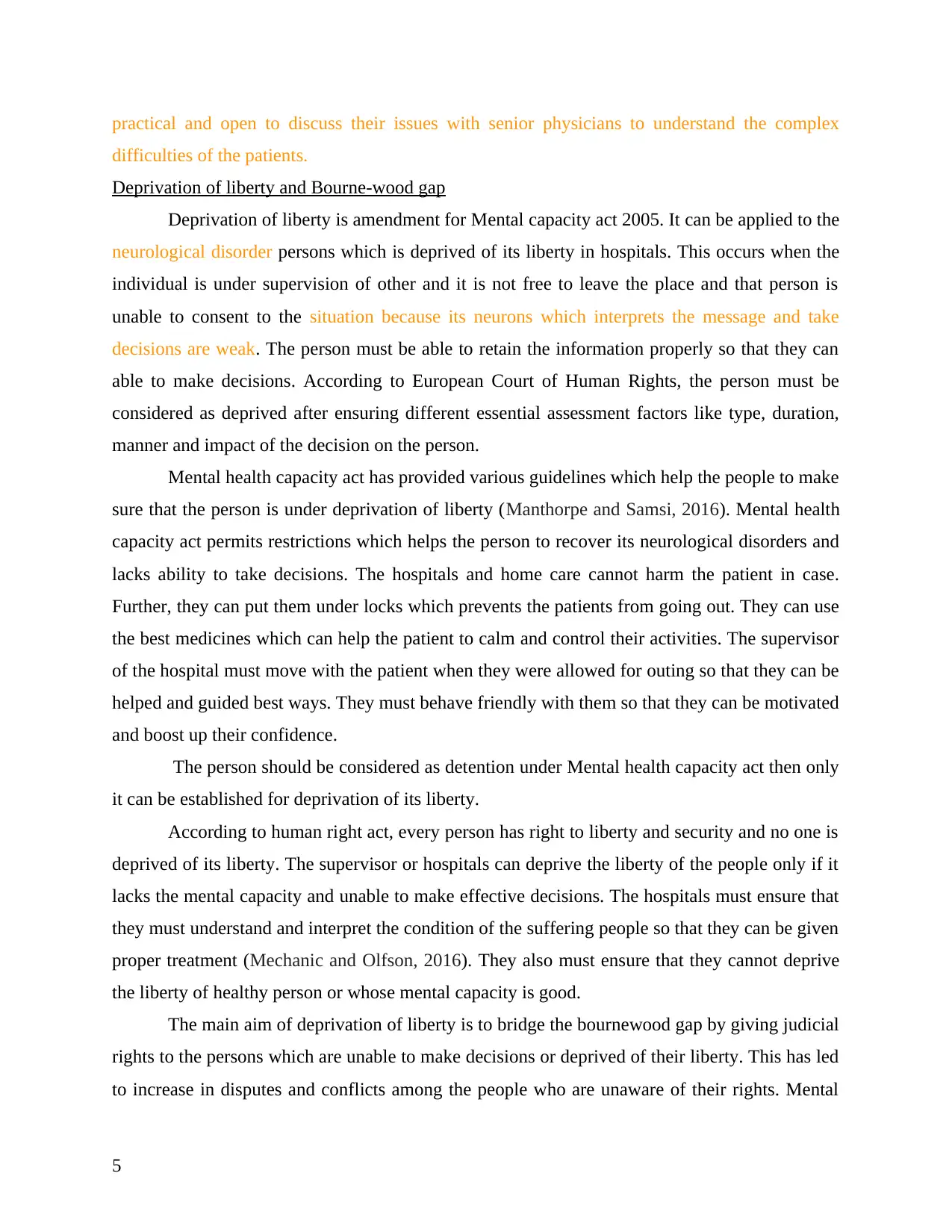
practical and open to discuss their issues with senior physicians to understand the complex
difficulties of the patients.
Deprivation of liberty and Bourne-wood gap
Deprivation of liberty is amendment for Mental capacity act 2005. It can be applied to the
neurological disorder persons which is deprived of its liberty in hospitals. This occurs when the
individual is under supervision of other and it is not free to leave the place and that person is
unable to consent to the situation because its neurons which interprets the message and take
decisions are weak. The person must be able to retain the information properly so that they can
able to make decisions. According to European Court of Human Rights, the person must be
considered as deprived after ensuring different essential assessment factors like type, duration,
manner and impact of the decision on the person.
Mental health capacity act has provided various guidelines which help the people to make
sure that the person is under deprivation of liberty (Manthorpe and Samsi, 2016). Mental health
capacity act permits restrictions which helps the person to recover its neurological disorders and
lacks ability to take decisions. The hospitals and home care cannot harm the patient in case.
Further, they can put them under locks which prevents the patients from going out. They can use
the best medicines which can help the patient to calm and control their activities. The supervisor
of the hospital must move with the patient when they were allowed for outing so that they can be
helped and guided best ways. They must behave friendly with them so that they can be motivated
and boost up their confidence.
The person should be considered as detention under Mental health capacity act then only
it can be established for deprivation of its liberty.
According to human right act, every person has right to liberty and security and no one is
deprived of its liberty. The supervisor or hospitals can deprive the liberty of the people only if it
lacks the mental capacity and unable to make effective decisions. The hospitals must ensure that
they must understand and interpret the condition of the suffering people so that they can be given
proper treatment (Mechanic and Olfson, 2016). They also must ensure that they cannot deprive
the liberty of healthy person or whose mental capacity is good.
The main aim of deprivation of liberty is to bridge the bournewood gap by giving judicial
rights to the persons which are unable to make decisions or deprived of their liberty. This has led
to increase in disputes and conflicts among the people who are unaware of their rights. Mental
5
difficulties of the patients.
Deprivation of liberty and Bourne-wood gap
Deprivation of liberty is amendment for Mental capacity act 2005. It can be applied to the
neurological disorder persons which is deprived of its liberty in hospitals. This occurs when the
individual is under supervision of other and it is not free to leave the place and that person is
unable to consent to the situation because its neurons which interprets the message and take
decisions are weak. The person must be able to retain the information properly so that they can
able to make decisions. According to European Court of Human Rights, the person must be
considered as deprived after ensuring different essential assessment factors like type, duration,
manner and impact of the decision on the person.
Mental health capacity act has provided various guidelines which help the people to make
sure that the person is under deprivation of liberty (Manthorpe and Samsi, 2016). Mental health
capacity act permits restrictions which helps the person to recover its neurological disorders and
lacks ability to take decisions. The hospitals and home care cannot harm the patient in case.
Further, they can put them under locks which prevents the patients from going out. They can use
the best medicines which can help the patient to calm and control their activities. The supervisor
of the hospital must move with the patient when they were allowed for outing so that they can be
helped and guided best ways. They must behave friendly with them so that they can be motivated
and boost up their confidence.
The person should be considered as detention under Mental health capacity act then only
it can be established for deprivation of its liberty.
According to human right act, every person has right to liberty and security and no one is
deprived of its liberty. The supervisor or hospitals can deprive the liberty of the people only if it
lacks the mental capacity and unable to make effective decisions. The hospitals must ensure that
they must understand and interpret the condition of the suffering people so that they can be given
proper treatment (Mechanic and Olfson, 2016). They also must ensure that they cannot deprive
the liberty of healthy person or whose mental capacity is good.
The main aim of deprivation of liberty is to bridge the bournewood gap by giving judicial
rights to the persons which are unable to make decisions or deprived of their liberty. This has led
to increase in disputes and conflicts among the people who are unaware of their rights. Mental
5
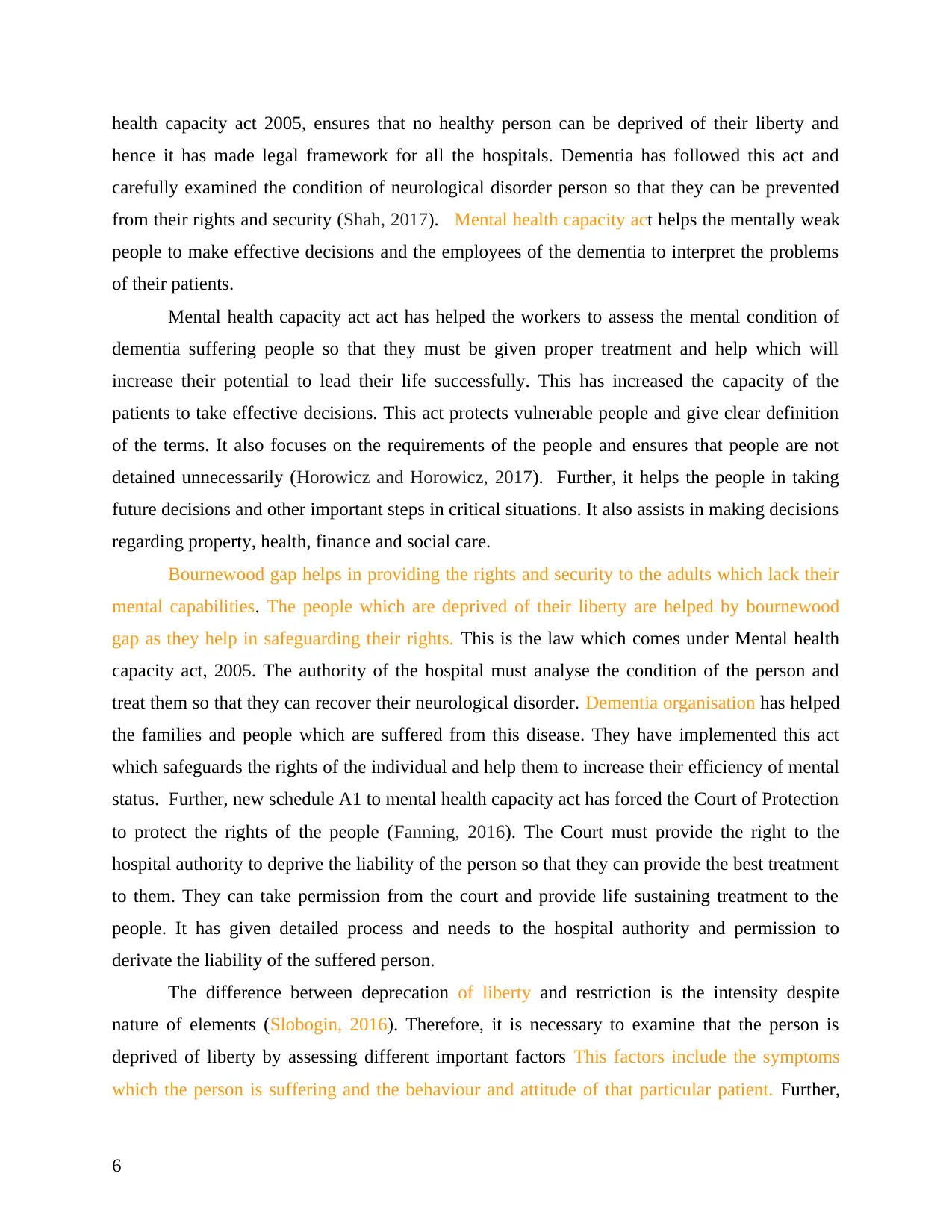
health capacity act 2005, ensures that no healthy person can be deprived of their liberty and
hence it has made legal framework for all the hospitals. Dementia has followed this act and
carefully examined the condition of neurological disorder person so that they can be prevented
from their rights and security (Shah, 2017). Mental health capacity act helps the mentally weak
people to make effective decisions and the employees of the dementia to interpret the problems
of their patients.
Mental health capacity act act has helped the workers to assess the mental condition of
dementia suffering people so that they must be given proper treatment and help which will
increase their potential to lead their life successfully. This has increased the capacity of the
patients to take effective decisions. This act protects vulnerable people and give clear definition
of the terms. It also focuses on the requirements of the people and ensures that people are not
detained unnecessarily (Horowicz and Horowicz, 2017). Further, it helps the people in taking
future decisions and other important steps in critical situations. It also assists in making decisions
regarding property, health, finance and social care.
Bournewood gap helps in providing the rights and security to the adults which lack their
mental capabilities. The people which are deprived of their liberty are helped by bournewood
gap as they help in safeguarding their rights. This is the law which comes under Mental health
capacity act, 2005. The authority of the hospital must analyse the condition of the person and
treat them so that they can recover their neurological disorder. Dementia organisation has helped
the families and people which are suffered from this disease. They have implemented this act
which safeguards the rights of the individual and help them to increase their efficiency of mental
status. Further, new schedule A1 to mental health capacity act has forced the Court of Protection
to protect the rights of the people (Fanning, 2016). The Court must provide the right to the
hospital authority to deprive the liability of the person so that they can provide the best treatment
to them. They can take permission from the court and provide life sustaining treatment to the
people. It has given detailed process and needs to the hospital authority and permission to
derivate the liability of the suffered person.
The difference between deprecation of liberty and restriction is the intensity despite
nature of elements (Slobogin, 2016). Therefore, it is necessary to examine that the person is
deprived of liberty by assessing different important factors This factors include the symptoms
which the person is suffering and the behaviour and attitude of that particular patient. Further,
6
hence it has made legal framework for all the hospitals. Dementia has followed this act and
carefully examined the condition of neurological disorder person so that they can be prevented
from their rights and security (Shah, 2017). Mental health capacity act helps the mentally weak
people to make effective decisions and the employees of the dementia to interpret the problems
of their patients.
Mental health capacity act act has helped the workers to assess the mental condition of
dementia suffering people so that they must be given proper treatment and help which will
increase their potential to lead their life successfully. This has increased the capacity of the
patients to take effective decisions. This act protects vulnerable people and give clear definition
of the terms. It also focuses on the requirements of the people and ensures that people are not
detained unnecessarily (Horowicz and Horowicz, 2017). Further, it helps the people in taking
future decisions and other important steps in critical situations. It also assists in making decisions
regarding property, health, finance and social care.
Bournewood gap helps in providing the rights and security to the adults which lack their
mental capabilities. The people which are deprived of their liberty are helped by bournewood
gap as they help in safeguarding their rights. This is the law which comes under Mental health
capacity act, 2005. The authority of the hospital must analyse the condition of the person and
treat them so that they can recover their neurological disorder. Dementia organisation has helped
the families and people which are suffered from this disease. They have implemented this act
which safeguards the rights of the individual and help them to increase their efficiency of mental
status. Further, new schedule A1 to mental health capacity act has forced the Court of Protection
to protect the rights of the people (Fanning, 2016). The Court must provide the right to the
hospital authority to deprive the liability of the person so that they can provide the best treatment
to them. They can take permission from the court and provide life sustaining treatment to the
people. It has given detailed process and needs to the hospital authority and permission to
derivate the liability of the suffered person.
The difference between deprecation of liberty and restriction is the intensity despite
nature of elements (Slobogin, 2016). Therefore, it is necessary to examine that the person is
deprived of liberty by assessing different important factors This factors include the symptoms
which the person is suffering and the behaviour and attitude of that particular patient. Further,
6
⊘ This is a preview!⊘
Do you want full access?
Subscribe today to unlock all pages.

Trusted by 1+ million students worldwide
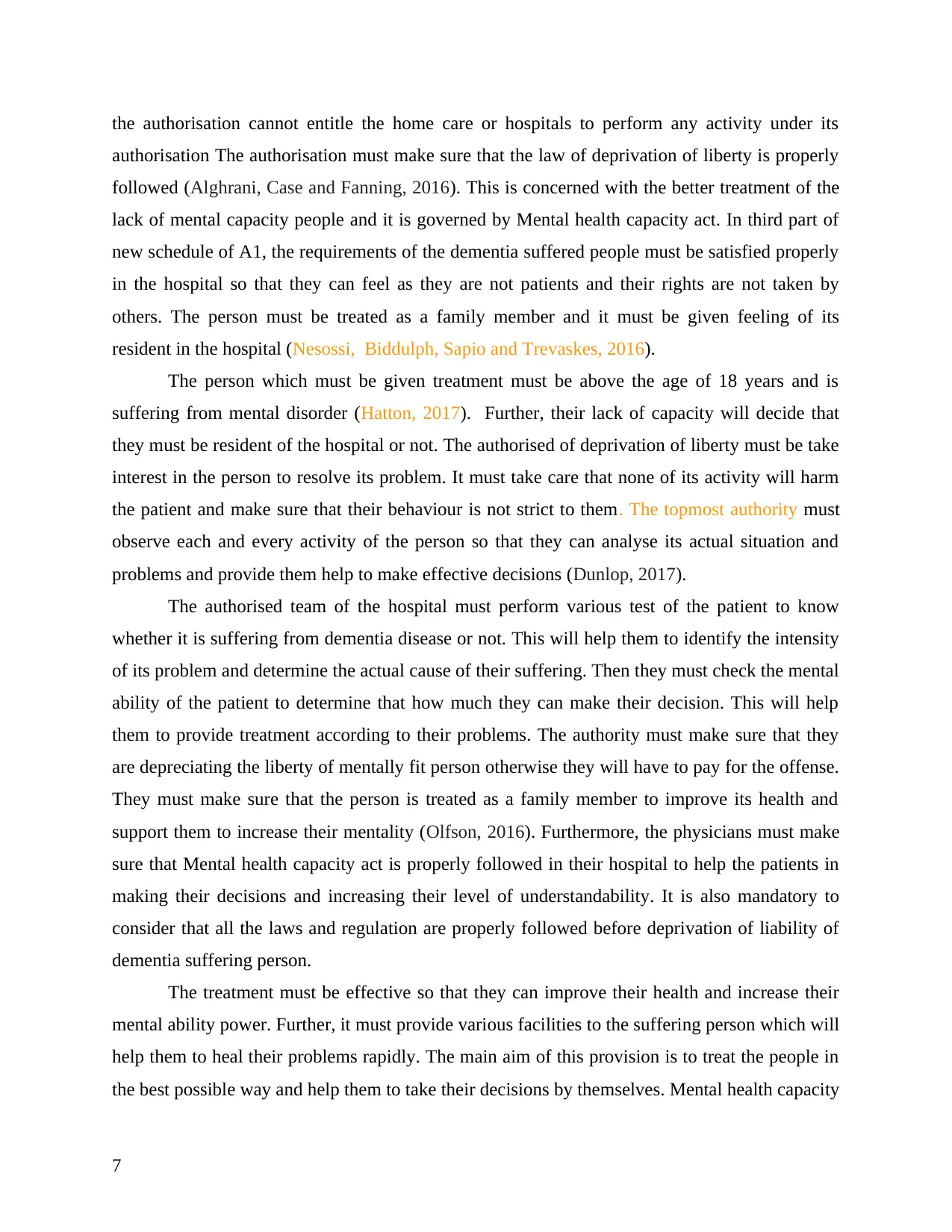
the authorisation cannot entitle the home care or hospitals to perform any activity under its
authorisation The authorisation must make sure that the law of deprivation of liberty is properly
followed (Alghrani, Case and Fanning, 2016). This is concerned with the better treatment of the
lack of mental capacity people and it is governed by Mental health capacity act. In third part of
new schedule of A1, the requirements of the dementia suffered people must be satisfied properly
in the hospital so that they can feel as they are not patients and their rights are not taken by
others. The person must be treated as a family member and it must be given feeling of its
resident in the hospital (Nesossi, Biddulph, Sapio and Trevaskes, 2016).
The person which must be given treatment must be above the age of 18 years and is
suffering from mental disorder (Hatton, 2017). Further, their lack of capacity will decide that
they must be resident of the hospital or not. The authorised of deprivation of liberty must be take
interest in the person to resolve its problem. It must take care that none of its activity will harm
the patient and make sure that their behaviour is not strict to them. The topmost authority must
observe each and every activity of the person so that they can analyse its actual situation and
problems and provide them help to make effective decisions (Dunlop, 2017).
The authorised team of the hospital must perform various test of the patient to know
whether it is suffering from dementia disease or not. This will help them to identify the intensity
of its problem and determine the actual cause of their suffering. Then they must check the mental
ability of the patient to determine that how much they can make their decision. This will help
them to provide treatment according to their problems. The authority must make sure that they
are depreciating the liberty of mentally fit person otherwise they will have to pay for the offense.
They must make sure that the person is treated as a family member to improve its health and
support them to increase their mentality (Olfson, 2016). Furthermore, the physicians must make
sure that Mental health capacity act is properly followed in their hospital to help the patients in
making their decisions and increasing their level of understandability. It is also mandatory to
consider that all the laws and regulation are properly followed before deprivation of liability of
dementia suffering person.
The treatment must be effective so that they can improve their health and increase their
mental ability power. Further, it must provide various facilities to the suffering person which will
help them to heal their problems rapidly. The main aim of this provision is to treat the people in
the best possible way and help them to take their decisions by themselves. Mental health capacity
7
authorisation The authorisation must make sure that the law of deprivation of liberty is properly
followed (Alghrani, Case and Fanning, 2016). This is concerned with the better treatment of the
lack of mental capacity people and it is governed by Mental health capacity act. In third part of
new schedule of A1, the requirements of the dementia suffered people must be satisfied properly
in the hospital so that they can feel as they are not patients and their rights are not taken by
others. The person must be treated as a family member and it must be given feeling of its
resident in the hospital (Nesossi, Biddulph, Sapio and Trevaskes, 2016).
The person which must be given treatment must be above the age of 18 years and is
suffering from mental disorder (Hatton, 2017). Further, their lack of capacity will decide that
they must be resident of the hospital or not. The authorised of deprivation of liberty must be take
interest in the person to resolve its problem. It must take care that none of its activity will harm
the patient and make sure that their behaviour is not strict to them. The topmost authority must
observe each and every activity of the person so that they can analyse its actual situation and
problems and provide them help to make effective decisions (Dunlop, 2017).
The authorised team of the hospital must perform various test of the patient to know
whether it is suffering from dementia disease or not. This will help them to identify the intensity
of its problem and determine the actual cause of their suffering. Then they must check the mental
ability of the patient to determine that how much they can make their decision. This will help
them to provide treatment according to their problems. The authority must make sure that they
are depreciating the liberty of mentally fit person otherwise they will have to pay for the offense.
They must make sure that the person is treated as a family member to improve its health and
support them to increase their mentality (Olfson, 2016). Furthermore, the physicians must make
sure that Mental health capacity act is properly followed in their hospital to help the patients in
making their decisions and increasing their level of understandability. It is also mandatory to
consider that all the laws and regulation are properly followed before deprivation of liability of
dementia suffering person.
The treatment must be effective so that they can improve their health and increase their
mental ability power. Further, it must provide various facilities to the suffering person which will
help them to heal their problems rapidly. The main aim of this provision is to treat the people in
the best possible way and help them to take their decisions by themselves. Mental health capacity
7
Paraphrase This Document
Need a fresh take? Get an instant paraphrase of this document with our AI Paraphraser
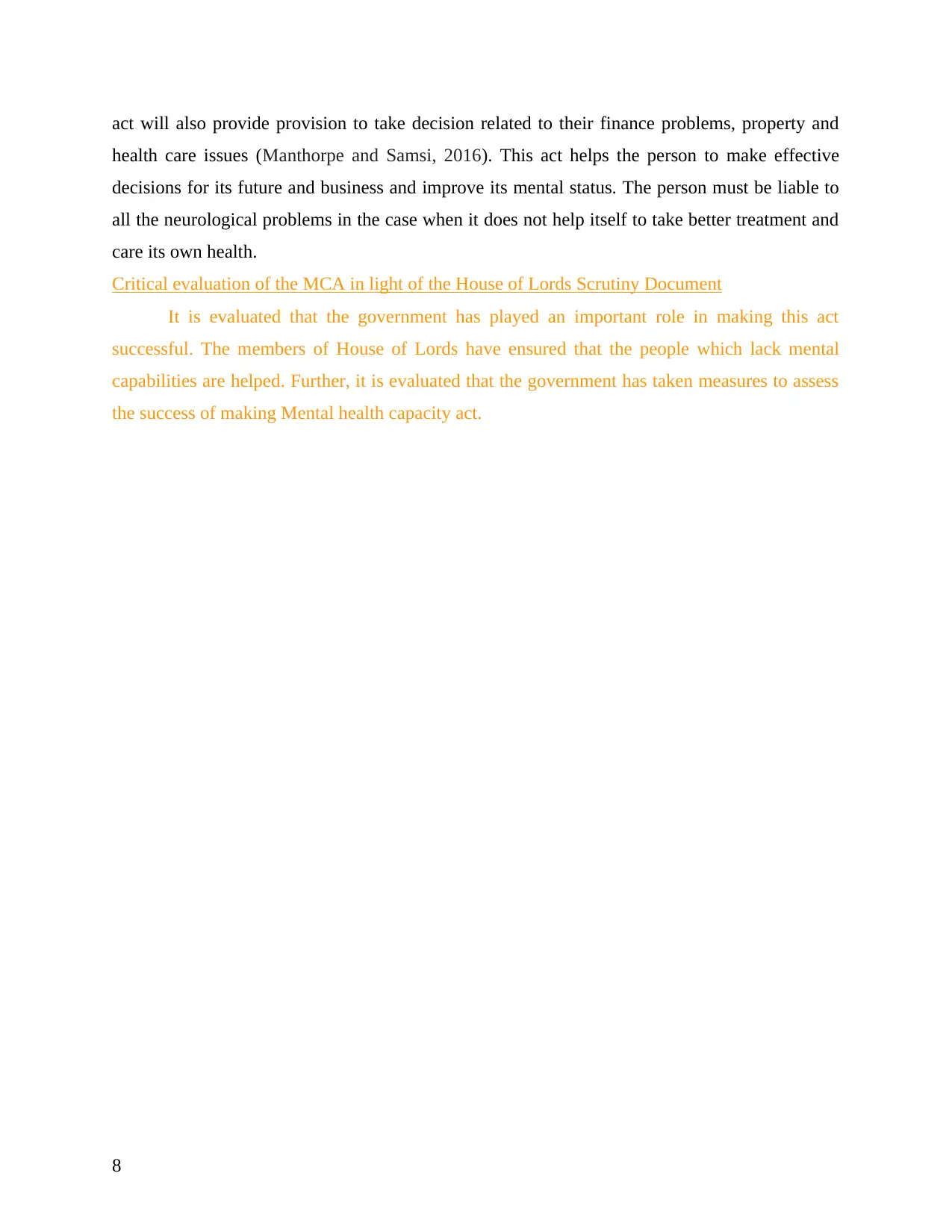
act will also provide provision to take decision related to their finance problems, property and
health care issues (Manthorpe and Samsi, 2016). This act helps the person to make effective
decisions for its future and business and improve its mental status. The person must be liable to
all the neurological problems in the case when it does not help itself to take better treatment and
care its own health.
Critical evaluation of the MCA in light of the House of Lords Scrutiny Document
It is evaluated that the government has played an important role in making this act
successful. The members of House of Lords have ensured that the people which lack mental
capabilities are helped. Further, it is evaluated that the government has taken measures to assess
the success of making Mental health capacity act.
8
health care issues (Manthorpe and Samsi, 2016). This act helps the person to make effective
decisions for its future and business and improve its mental status. The person must be liable to
all the neurological problems in the case when it does not help itself to take better treatment and
care its own health.
Critical evaluation of the MCA in light of the House of Lords Scrutiny Document
It is evaluated that the government has played an important role in making this act
successful. The members of House of Lords have ensured that the people which lack mental
capabilities are helped. Further, it is evaluated that the government has taken measures to assess
the success of making Mental health capacity act.
8
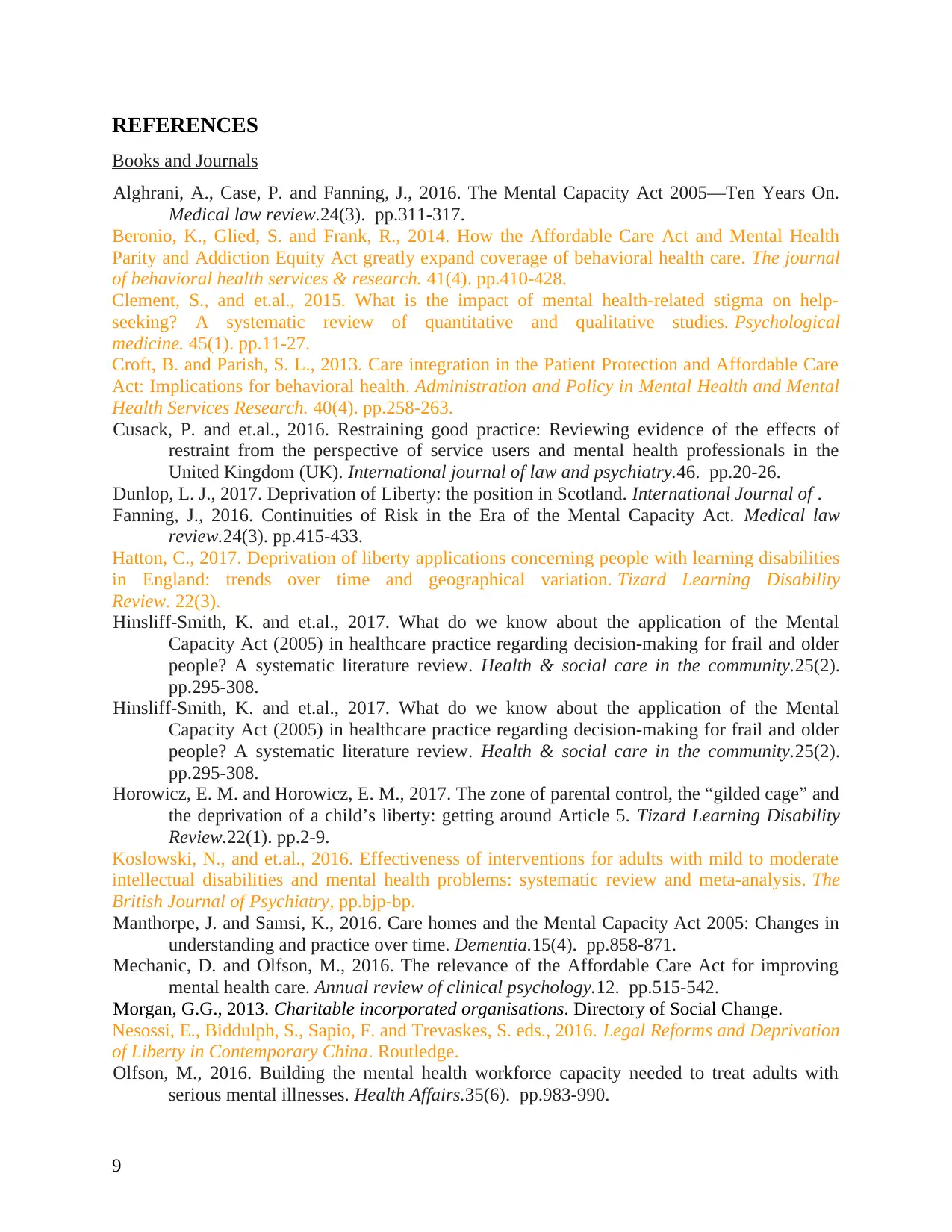
REFERENCES
Books and Journals
Alghrani, A., Case, P. and Fanning, J., 2016. The Mental Capacity Act 2005—Ten Years On.
Medical law review.24(3). pp.311-317.
Beronio, K., Glied, S. and Frank, R., 2014. How the Affordable Care Act and Mental Health
Parity and Addiction Equity Act greatly expand coverage of behavioral health care. The journal
of behavioral health services & research. 41(4). pp.410-428.
Clement, S., and et.al., 2015. What is the impact of mental health-related stigma on help-
seeking? A systematic review of quantitative and qualitative studies. Psychological
medicine. 45(1). pp.11-27.
Croft, B. and Parish, S. L., 2013. Care integration in the Patient Protection and Affordable Care
Act: Implications for behavioral health. Administration and Policy in Mental Health and Mental
Health Services Research. 40(4). pp.258-263.
Cusack, P. and et.al., 2016. Restraining good practice: Reviewing evidence of the effects of
restraint from the perspective of service users and mental health professionals in the
United Kingdom (UK). International journal of law and psychiatry.46. pp.20-26.
Dunlop, L. J., 2017. Deprivation of Liberty: the position in Scotland. International Journal of .
Fanning, J., 2016. Continuities of Risk in the Era of the Mental Capacity Act. Medical law
review.24(3). pp.415-433.
Hatton, C., 2017. Deprivation of liberty applications concerning people with learning disabilities
in England: trends over time and geographical variation. Tizard Learning Disability
Review. 22(3).
Hinsliff‐Smith, K. and et.al., 2017. What do we know about the application of the Mental
Capacity Act (2005) in healthcare practice regarding decision‐making for frail and older
people? A systematic literature review. Health & social care in the community.25(2).
pp.295-308.
Hinsliff‐Smith, K. and et.al., 2017. What do we know about the application of the Mental
Capacity Act (2005) in healthcare practice regarding decision‐making for frail and older
people? A systematic literature review. Health & social care in the community.25(2).
pp.295-308.
Horowicz, E. M. and Horowicz, E. M., 2017. The zone of parental control, the “gilded cage” and
the deprivation of a child’s liberty: getting around Article 5. Tizard Learning Disability
Review.22(1). pp.2-9.
Koslowski, N., and et.al., 2016. Effectiveness of interventions for adults with mild to moderate
intellectual disabilities and mental health problems: systematic review and meta-analysis. The
British Journal of Psychiatry, pp.bjp-bp.
Manthorpe, J. and Samsi, K., 2016. Care homes and the Mental Capacity Act 2005: Changes in
understanding and practice over time. Dementia.15(4). pp.858-871.
Mechanic, D. and Olfson, M., 2016. The relevance of the Affordable Care Act for improving
mental health care. Annual review of clinical psychology.12. pp.515-542.
Morgan, G.G., 2013. Charitable incorporated organisations. Directory of Social Change.
Nesossi, E., Biddulph, S., Sapio, F. and Trevaskes, S. eds., 2016. Legal Reforms and Deprivation
of Liberty in Contemporary China. Routledge.
Olfson, M., 2016. Building the mental health workforce capacity needed to treat adults with
serious mental illnesses. Health Affairs.35(6). pp.983-990.
9
Books and Journals
Alghrani, A., Case, P. and Fanning, J., 2016. The Mental Capacity Act 2005—Ten Years On.
Medical law review.24(3). pp.311-317.
Beronio, K., Glied, S. and Frank, R., 2014. How the Affordable Care Act and Mental Health
Parity and Addiction Equity Act greatly expand coverage of behavioral health care. The journal
of behavioral health services & research. 41(4). pp.410-428.
Clement, S., and et.al., 2015. What is the impact of mental health-related stigma on help-
seeking? A systematic review of quantitative and qualitative studies. Psychological
medicine. 45(1). pp.11-27.
Croft, B. and Parish, S. L., 2013. Care integration in the Patient Protection and Affordable Care
Act: Implications for behavioral health. Administration and Policy in Mental Health and Mental
Health Services Research. 40(4). pp.258-263.
Cusack, P. and et.al., 2016. Restraining good practice: Reviewing evidence of the effects of
restraint from the perspective of service users and mental health professionals in the
United Kingdom (UK). International journal of law and psychiatry.46. pp.20-26.
Dunlop, L. J., 2017. Deprivation of Liberty: the position in Scotland. International Journal of .
Fanning, J., 2016. Continuities of Risk in the Era of the Mental Capacity Act. Medical law
review.24(3). pp.415-433.
Hatton, C., 2017. Deprivation of liberty applications concerning people with learning disabilities
in England: trends over time and geographical variation. Tizard Learning Disability
Review. 22(3).
Hinsliff‐Smith, K. and et.al., 2017. What do we know about the application of the Mental
Capacity Act (2005) in healthcare practice regarding decision‐making for frail and older
people? A systematic literature review. Health & social care in the community.25(2).
pp.295-308.
Hinsliff‐Smith, K. and et.al., 2017. What do we know about the application of the Mental
Capacity Act (2005) in healthcare practice regarding decision‐making for frail and older
people? A systematic literature review. Health & social care in the community.25(2).
pp.295-308.
Horowicz, E. M. and Horowicz, E. M., 2017. The zone of parental control, the “gilded cage” and
the deprivation of a child’s liberty: getting around Article 5. Tizard Learning Disability
Review.22(1). pp.2-9.
Koslowski, N., and et.al., 2016. Effectiveness of interventions for adults with mild to moderate
intellectual disabilities and mental health problems: systematic review and meta-analysis. The
British Journal of Psychiatry, pp.bjp-bp.
Manthorpe, J. and Samsi, K., 2016. Care homes and the Mental Capacity Act 2005: Changes in
understanding and practice over time. Dementia.15(4). pp.858-871.
Mechanic, D. and Olfson, M., 2016. The relevance of the Affordable Care Act for improving
mental health care. Annual review of clinical psychology.12. pp.515-542.
Morgan, G.G., 2013. Charitable incorporated organisations. Directory of Social Change.
Nesossi, E., Biddulph, S., Sapio, F. and Trevaskes, S. eds., 2016. Legal Reforms and Deprivation
of Liberty in Contemporary China. Routledge.
Olfson, M., 2016. Building the mental health workforce capacity needed to treat adults with
serious mental illnesses. Health Affairs.35(6). pp.983-990.
9
⊘ This is a preview!⊘
Do you want full access?
Subscribe today to unlock all pages.

Trusted by 1+ million students worldwide
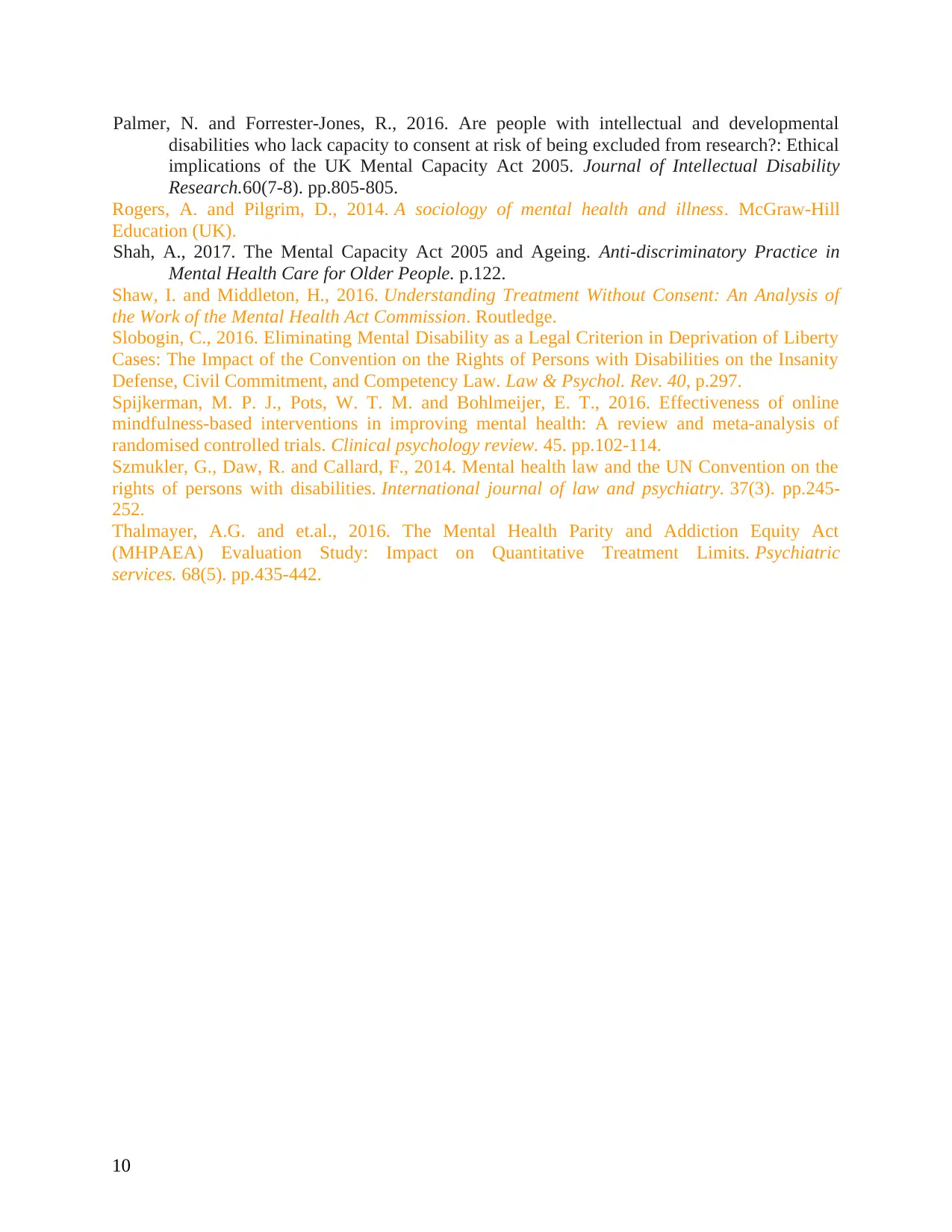
Palmer, N. and Forrester-Jones, R., 2016. Are people with intellectual and developmental
disabilities who lack capacity to consent at risk of being excluded from research?: Ethical
implications of the UK Mental Capacity Act 2005. Journal of Intellectual Disability
Research.60(7-8). pp.805-805.
Rogers, A. and Pilgrim, D., 2014. A sociology of mental health and illness. McGraw-Hill
Education (UK).
Shah, A., 2017. The Mental Capacity Act 2005 and Ageing. Anti-discriminatory Practice in
Mental Health Care for Older People. p.122.
Shaw, I. and Middleton, H., 2016. Understanding Treatment Without Consent: An Analysis of
the Work of the Mental Health Act Commission. Routledge.
Slobogin, C., 2016. Eliminating Mental Disability as a Legal Criterion in Deprivation of Liberty
Cases: The Impact of the Convention on the Rights of Persons with Disabilities on the Insanity
Defense, Civil Commitment, and Competency Law. Law & Psychol. Rev. 40, p.297.
Spijkerman, M. P. J., Pots, W. T. M. and Bohlmeijer, E. T., 2016. Effectiveness of online
mindfulness-based interventions in improving mental health: A review and meta-analysis of
randomised controlled trials. Clinical psychology review. 45. pp.102-114.
Szmukler, G., Daw, R. and Callard, F., 2014. Mental health law and the UN Convention on the
rights of persons with disabilities. International journal of law and psychiatry. 37(3). pp.245-
252.
Thalmayer, A.G. and et.al., 2016. The Mental Health Parity and Addiction Equity Act
(MHPAEA) Evaluation Study: Impact on Quantitative Treatment Limits. Psychiatric
services. 68(5). pp.435-442.
10
disabilities who lack capacity to consent at risk of being excluded from research?: Ethical
implications of the UK Mental Capacity Act 2005. Journal of Intellectual Disability
Research.60(7-8). pp.805-805.
Rogers, A. and Pilgrim, D., 2014. A sociology of mental health and illness. McGraw-Hill
Education (UK).
Shah, A., 2017. The Mental Capacity Act 2005 and Ageing. Anti-discriminatory Practice in
Mental Health Care for Older People. p.122.
Shaw, I. and Middleton, H., 2016. Understanding Treatment Without Consent: An Analysis of
the Work of the Mental Health Act Commission. Routledge.
Slobogin, C., 2016. Eliminating Mental Disability as a Legal Criterion in Deprivation of Liberty
Cases: The Impact of the Convention on the Rights of Persons with Disabilities on the Insanity
Defense, Civil Commitment, and Competency Law. Law & Psychol. Rev. 40, p.297.
Spijkerman, M. P. J., Pots, W. T. M. and Bohlmeijer, E. T., 2016. Effectiveness of online
mindfulness-based interventions in improving mental health: A review and meta-analysis of
randomised controlled trials. Clinical psychology review. 45. pp.102-114.
Szmukler, G., Daw, R. and Callard, F., 2014. Mental health law and the UN Convention on the
rights of persons with disabilities. International journal of law and psychiatry. 37(3). pp.245-
252.
Thalmayer, A.G. and et.al., 2016. The Mental Health Parity and Addiction Equity Act
(MHPAEA) Evaluation Study: Impact on Quantitative Treatment Limits. Psychiatric
services. 68(5). pp.435-442.
10
1 out of 10
Related Documents
Your All-in-One AI-Powered Toolkit for Academic Success.
+13062052269
info@desklib.com
Available 24*7 on WhatsApp / Email
![[object Object]](/_next/static/media/star-bottom.7253800d.svg)
Unlock your academic potential
Copyright © 2020–2026 A2Z Services. All Rights Reserved. Developed and managed by ZUCOL.




